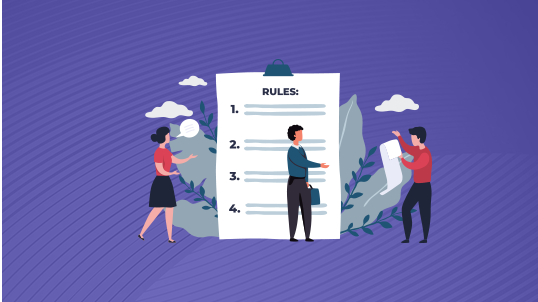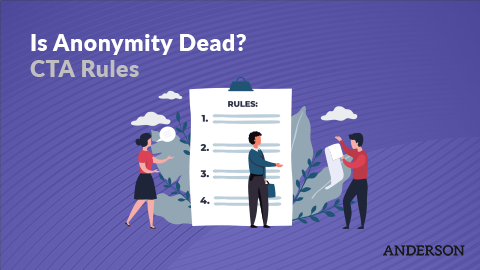
The Corporate Transparency Act is a federal law that requires small, privately held business entities to report beneficial ownership information to the United States Department of the Treasury’s Financial Crimes Enforcement Network, the same organization that collects information on foreign banks and financial accounts. Its stated purpose is to prevent criminal activities by outing bad actors who may be using businesses to launder money, commit tax fraud, finance terrorism, or carry out other illegal activities. In doing so, it affects other business owners who’d prefer to remain anonymous for legitimate reasons.
Here, we review the rules of the CTA, explain the reasoning behind it, and discuss its impact on corporate anonymity.
Key Takeaways:
- The CTA, signed into law in 2021, introduced reporting requirements for BOI, which hadn’t existed previously.
- The purpose of the CTA is to prevent illegal activity by identifying beneficial owners who could be using their businesses to facilitate crimes such as tax fraud, money laundering, and terror financing.
- The CTA reporting regulation applies to business entities that offer limited liability to their owners, such as corporations, limited liability companies, and limited liability partnerships. The law also specifies 23 types of entities that are exempt from reporting.
- Non-exempt companies must submit the BOI of every beneficial owner with at least 25% interest in the organization to FinCEN.
- BOI includes each beneficial owner’s name, date of birth, address, and photo ID.
Tax & Asset Protection Workshop
Learn about Real Estate & Asset Protection at our next
FREE LIVE STREAM
A Historical Overview of the CTA
Before the CTA, there were no reporting requirements that applied to BOI or information that identifies the people who directly or indirectly exercise control over a company. Beneficial owners could show their share of ownership under another name, allowing them to remain anonymous. Though business owners may have legitimate reasons for remaining anonymous — such as protecting themselves from legal liability or harassment — the concern was that bad actors could use anonymous ownership to create shell companies for facilitating illegal activities.
The CTA was designed to address the potential for illicit business activities. Congress passed the law in 2021, and it will become effective on Jan. 1, 2024.
The CTA Rules
The rules of the CTA cover the following areas:
What companies are required to report?
The CTA requires both domestic and foreign companies to report BOI to FinCEN. The reporting requirement applies to business entities that offer limited liability to owners, such as:
- Corporations.
- Limited liability companies.
- Limited liability partnerships.
- Limited partnerships.
- Business trusts.
What companies are exempt from reporting?
The CTA identifies 23 types of entities that are exempt from reporting BOI. These are:
- Securities-reporting issuers.
- Governmental authorities.
- Banks.
- Credit unions.
- Depository institution holding companies.
- Money services businesses.
- Securities brokers or dealers.
- Securities exchanges or clearing agencies.
- Entities registered under the Securities Exchange Act of 1934.
- Entities registered under the Commodity Exchange Act.
- Investment companies or advisors.
- Venture capital fund advisors.
- Insurance companies.
- State-licensed insurance producers.
- Accounting firms.
- Public utilities.
- Financial market utilities.
- Pooled investment vehicles.
- Tax-exempt entities.
- Entities that assist tax-exempt entities.
- Large operating companies.
- Subsidiaries of the above, excepting 6, 18, and 20.
- Inactive entities.
What information must be reported?
Every qualifying company must disclose both business information and BOI in their report to FinCEN. The primary business information includes:
- The full name of the company.
- Any trade name associated with the company.
- The street address of the business.
- The state or tribal jurisdiction of formation.
- The company’s taxpayer identification number.
The required BOI pertains to every person who owns at least 25% interest in the company. The report must include each owner’s:
- Full name.
- Date of birth.
- Current residential address.
- Photo ID and unique identifying number.
For the last item, acceptable forms of ID include a current U.S. passport, a current foreign passport, a state-issued driver’s license, and a state or local identifying document.
When must this information be reported?
Companies created or registered before Jan. 1, 2024, have one year to submit their initial filing. Those created or registered after said date have just 30 days to file. The report is a one-time filing, but companies must file updated reports within 30 days of any change to BOI.
Not all changes to BOI warrant an update, however. Generally, only changes to an owner’s name or residential address require a new report and identifying image. Updates are not necessary when an owner renews or changes their submitted form of identification.
How can companies file?
Companies can file their reports electronically using a secure filing system on the FinCEN website. FinCEN is still developing the system as of September 2023, but the organization states that it will be available before the reporting deadlines.
There will be a specific form that companies must use to file their reports. This form is also not yet available but will be posted to FinCEN’s BOI landing page when it’s ready.
What are the penalties for noncompliance?
Failing to file within the specified time frames can result in fines of up to $10,000. Individuals who fail to report or who willfully provide false information may also face up to two years of prison time.
Is Anonymity Dead?
Not necessarily. Though the CTA requires companies to disclose information that may previously have been confidential, that doesn’t mean BOI will be available to whoever wants it. The primary organizations that will have access to the pertinent information are:
- The U.S. Department of the Treasury.
- Federal agencies concerned with national security, intelligence, and law enforcement.
- State and local law enforcement agencies involved in relevant investigations.
Financial institutions, in accordance with anti-money laundering compliance activities, may also have access to the information. The public, however, will not be able to access the information to identify beneficial owners, nor will the information be subject to requests under the Freedom of Information Act.
If you’re a business owner who may be impacted by the CTA, there are several things you can do to prepare. First, determine whether you’re exempt from the reporting requirement. If you’re not exempt, we recommend getting started on gathering the required information and developing a system for tracking and updating BOI. Should you need help making sense of the new requirements, reach out to Anderson Advisors for support. Together, we can ensure your compliance with the CTA while optimizing your entity management.
Free Strategy Session with an Anderson Advisor
Receive a detailed risk assessment to assist in lowering problem areas that could wipe out all of your assets with one wrong move. Speak with an Anderson Professional Advisor to get your FREE Strategy Session.
Limited-Time Offer: ($750 value.)
















